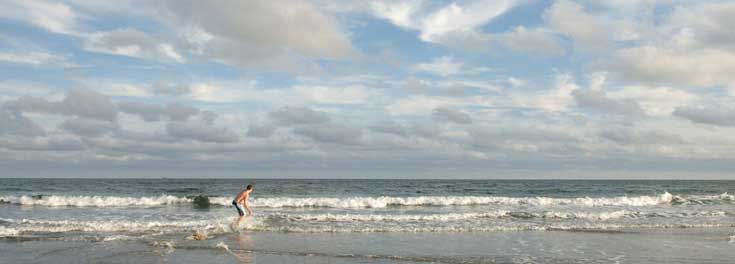 Beach season is in full swing here in Rhode Island, but it’s always beach season at the University of Rhode Island. There are a dozen public beaches near our main campus in Kingston, and our Narragansett Bay campus has its own beach just a few steps from its classrooms. So there are plenty of opportunities to study, learn, play and conduct research at the beach year round.
Beach season is in full swing here in Rhode Island, but it’s always beach season at the University of Rhode Island. There are a dozen public beaches near our main campus in Kingston, and our Narragansett Bay campus has its own beach just a few steps from its classrooms. So there are plenty of opportunities to study, learn, play and conduct research at the beach year round.
For instance, you could also take a kinesiology class with Assistant Professor Emily Clapham and teach surfing to children with Down syndrome and autism as part of our adaptive physical education certificate program. “What we see through the aquatics program is that being in the water is very soothing for the kids,” said one recent graduate. “They develop a sense of weightlessness that gives their body a better range of motion because they relax more.”
You could also become a Coastal Fellow, an initiative designed to involve undergraduate students in addressing environmental issues. Many fellows conduct research at the beach, from studying sea level rise and coastal erosion to beach-nesting birds, seaweeds, and aquaculture. Wildlife biology major Katelyn Belleville said the program opened her eyes to the scientific process. “Coastal Fellows opened up the world of fieldwork to me,” she said. “I knew I always wanted to be outside, but practicing wildlife biology firsthand gave me the concrete knowledge and experience I needed. And I got paid, too.”
If you prefer your beach experience a little less physically demanding, you might enroll in our English class on literature and the sea, write about your beach experiences, and enter our annual maritime essay contest. We even have a Literature & Sea Lecture Series.
Or maybe you’d like to study in our Marine Affairs program and learn about policymaking as it relates to beaches and the coastal environment; or become an ocean engineer and learn about the use of robotics in studying changing coastlines; or study pharmacy and how new drugs are being discovered from marine organisms; or use your talents in landscape design to work with coastal communities to help them prepare for increasing storms. And at our Graduate School of Oceanography, you can study the sandy sediments on the seafloor, how waves and tides affect the beach, the marine life that lives in the intertidal zone, and many other beach-related subjects.
And when you’re finished learning about all of these aspects of the beach, you can join our surfing, fishing, or scuba diving clubs. Or dig for clams. Or become a lifeguard. And at the end of the day, you can even go home to the beach, since many of our upperclassmen who move off campus live in homes within sight of the beach.
Last year, the University of Rhode Island was named #3 in Best Value College’s list of the 30 Most Beautiful Coastal College Campuses! Rhode Island is, after all, the Ocean State. And at URI, the beach is much more than a beautiful summertime destination—it’s a big part of our history, culture, and everyday life.
